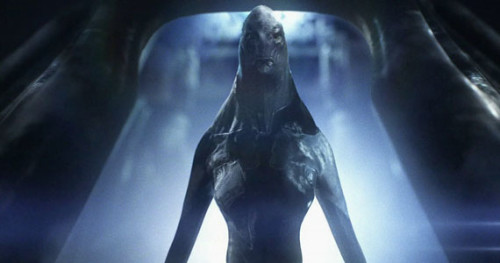This guest post by Sean Weaver appears as part of our theme week on Dystopias.
I’ve often stood under the night sky, barefoot in the dew-soaked grass, contemplating the vast expanse of the universe, the sky. The stars, like little blips of life, unfold and become more prominent the further away from the cityscapes that fill suburban horizons. I’ve felt the uncanny feeling that exists when contemplating that space. I’ve also felt the familiar feeling, knowing that I am not the first to experience such phenomena. Like countless others before, I’ve stared at that unknown, that unreachable space, in which only a few have ever touched. On the other hand, I’ve experienced the gravity that tethers all objects and bodies to the ground. The weight of the sky, pressing feet firmly to the ground, reminds me of the forces that define my life and the gravity we hold so much faith in. What were to happen if we suddenly lost that faith, the sky falling, crashing down, with the full weight of gravity behind it? What if the gravity holding your body in stasis failed?
Many science fiction narratives seek to answer this question, to go beyond the familiar into the uncanny where every aspect of our existence is called into question, especially when alien beings have come to colonize the Earth and its inhabitants. It’s a dystopian narrative told over and over. Aliens discover a valuable resource on Earth. Aliens pillage and destroy. Humans sometimes prevail. Given the Earth’s colonial history, we can understand the fascination behind such narratives. Enter Falling Skies. Falling Skies takes place after Earth is imperialized by alien overlords called the Esphendi. The show focuses on a group of Americans, led by Tom Mason (Noah Wyle), his family, and Captain Weaver (Will Patton), who have pulled together to fight the alien hostiles, even naming their ragtag group of misfits the 2nd Mass. This is, more or less, all anyone needs to know in terms of narrative/summary; to go into further detail would give away to many spoilers.
While many critics and viewers have pointed out the flaws in Steven Spielberg and Robert Rodat’s Falling Skies—such as its romanticism of white European settler propaganda and disregard for indigenous tactics of colonial resistance, to its blatant portrayal of male dominance /heteronormativity, and its American patriotic ethnocentrism—the show has drastically changed since its first airing in 2011. Although I agree with what many have said of the show, even having my own love/hate relationship with it, the show evolves in season four, and that’s where I’d like to focus in this critique.
The show shifts gears, moving away from the male dominant narratives, to finally developing its female protagonists, and in doing so reveals the gravity gender and performativity have over certain bodies, and its certain tendency to perpetuate the oppression of said bodies. Judith Butler writes, in her book of critical feminist/queer essays Bodies That Matter, on the discursive limits of sex, the body, and performativity, stating:
Hence, the reading of “performativity” as willful and arbitrary choice misses the point that the historicity of discourse and, in particular the historicity of norms (the “chains” of reiteration invoked and dissimulated in the imperative utterance) constitute the power of discourse to enact what it names. To think of “sex” as an imperative in this way means that a subject is addressed and produced by such a norm, and that this norm—and the regulatory power of which it is a token—materializes bodies as an effect of that injunction. And, yet, this “materialization,” while far from artificial, is not fully stable…And further, this imperative, this injunction, requires and institutes a “constitutive outside”—the unspeakable, the unviable, the nonnarrativizable that secures and, hence fails to secure the very borders of materiality. The normative force of performativity—its power to establish what qualifies as “being”—works not only through reiteration, but through exclusion as well. And in the case of bodies those exclusions haunt signification as it abject borders or as that which is strictly foreclosed: the unlivable, the nonnarrativizable, the traumatic…To the extent that we understand identity-claims as rallying points for political mobilization, they appear to hold out the promise of unity, solidarity, universality.
In this passage, Butler reveals that it is not enough to read bodies and performativity as necessary, or forced. This type of reading reproduces hegemonic norms, and regulates power structures that oppress bodies, specifically the bodies of women. Furthermore, Butler reveals that this type of treatment of bodies and performativity creates a “constitutive outside,” which leads to false promises of unity and solidarity.
It is this “constitutive outside” that I would like to explore in regard to season four of Falling Skies, and how the main female protagonist Anne Mason (Moon Bloodgood) reproduces the artificial illusion of unity and solidarity while forcing her hybrid daughter into the traumatic space this outside represents. Throughout the show, Anne has pushed the boundaries of gender and tradition in her survival in the dystopian landscape created by the arrival of the Esphendi overlords. She is at the head of her field, a field dominated by men, and as a doctor she is the best there is—even developing a technique to remove the harnesses that change the children into the Skitter slaves that do the work of their alien oppressors. In this sense, Anne pushes past the restraints of performativity that men would expect of her.
However, in the beginning of season four, Anne has stepped out of her role as the healer. She is no longer the doctor who has kept the bodies of her people stitched together. After experiencing a traumatic capture at the hands of the Esphendi, resulting in Anne giving birth to a hybrid daughter, Alexi (Scarlett Byrne), Anne begins to lose control. For the Esphendi are master colonizers, and realize that to control the men they must first control the women. This experience changes Anne, and she no longer takes up the role of doctor. Instead, she steps into the role of leader and a warrior woman out for revenge. But she no longer pushes past performativity; instead, she lets performativity control her. She forgoes all feelings, and in doing so reveals the true nature of dominance over other bodies. Anne becomes so raveled up in performing the role of warrior, that she begins to instill fear in others in regards to the nature and being of her daughter Lexi.
Lexi is a hybrid in every sense of the word; she is both human and Esphendi. Due to her hybridity, Lexi can control the matter and elements of the Earth. She also has the ability to mature quickly. However, as a hybrid Lexi is rejected by the people of the 2nd Mass, including her own mother. In fact, at one point Anne exclaims that the Esphendi had killed her daughter, leaving Lexi perplexed at the idea of family. She even questions her mother stating, “But, I am your daughter; we are family. Why am I different simply because I am Esphendi and human?” Eventually, through Anne’s rejection, Lexi sacrifices herself in a mission to the moon to destroy the power source of the Esphendi Empire because she realizes that her existence is artificial, insubstantial. She finds herself in the space of the “constitutive outside.” Unknowingly, Anne perpetuates the fear of otherness. She doesn’t recognize her daughter as a woman, because she is foreign, alien, hybrid. In rejecting Lexi, Anne perpetuates the false solidarity and universal acceptance Butler points out in the above passage. Anne sees Lexi as failing to perform the necessary gender of her body. Lexi is the very symbol of a failed body, the failed universal woman Anne has expected of her daughter.
This is only the second evolution of Anne’s character arc. But, it reveals the nature of performativity and how it may be experienced in a dystopian world. Falling Skies is finally beginning to evolve and question the very ideology that seems to define our existence. I wonder, however, what more will be revealed when it comes to the nature of bodies. While season five is the final season, I wonder how Anne will handle the conflicts to come. What will become the outcome when Anne and her family begin to rebuild the world once the Esphendi have been defeated, if they are defeated? Will they repeat the past? Will Anne push pass the performativity that has come to control her actions and beliefs or will she succumb to the gravitational pull that forces certain bodies to fail when skies come falling down?
Sean Weaver has a MA in English/Literature from Kutztown University. He is currently News Editor at Vada, an online magazine from the UK with a new queer perspective. When he isn’t reading or writing, he is hard at work looking for new ways to understand what it means to be queer.
Twitter: @levirush8
Blog: http://post-colonial-






